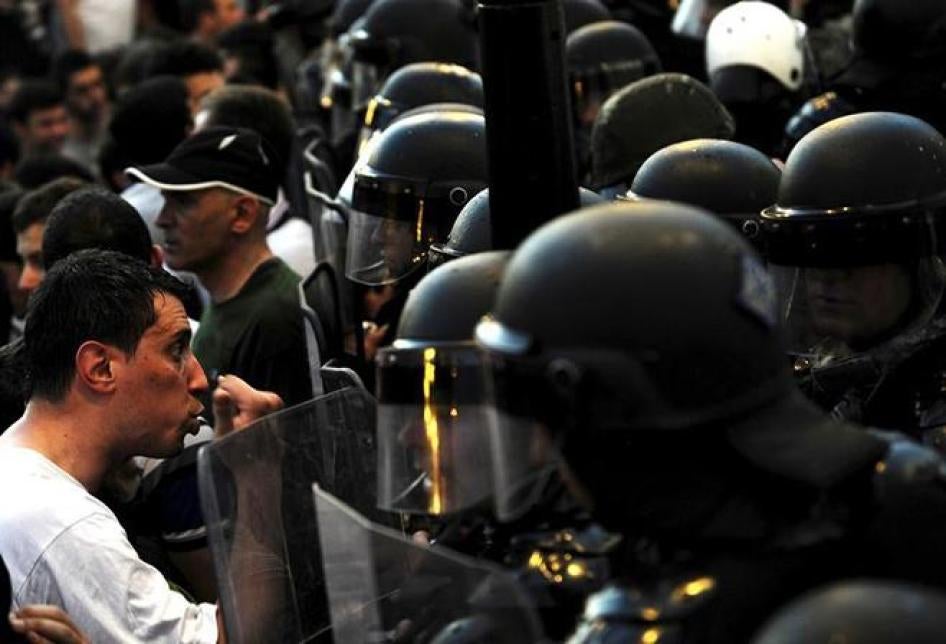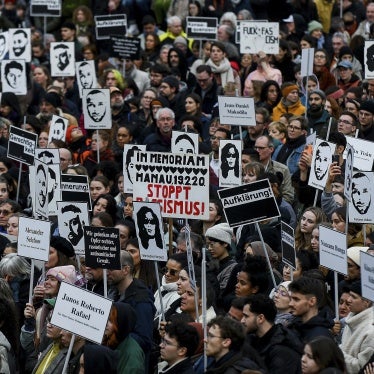(Budapest) – Police allegedly used excessive force against protesters, bystanders, and a journalist during a May 5, 2015 demonstration in Skopje, Human Rights Watch said today. The Macedonian authorities should investigate the allegations and ensure the right to peaceful assembly.
Human Rights Watch interviewed seven people, including a journalist covering the protest, who said they were beaten by police and six others who said they witnessed excessive force by police or suffered minor accidental injuries as police dispersed protesters. Several people who were arrested were ordered by the police to pay large fines.
“Policing demonstrations can be difficult, but beating people certainly isn’t acceptable crowd control,” said Lydia Gall, Balkans and Eastern Europe researcher at Human Rights Watch. “And beating a journalist covering a protest is not just unlawful, but an indefensible attack on press freedom.”
Macedonian authorities should promptly investigate these serious allegations of excessive and unwarranted force and hold police officers responsible to account, Human Rights Watch said. Macedonian authorities should take steps to ensure that journalists can report safely and freely, not least when others are exercising basic rights such as to protest peacefully.
The May 5 demonstration was linked to an ongoing political crisis in Macedonia. Since February, the main opposition party has released a series of recordings implicating government officials in misconduct such as wiretapping 20,000 people, including activists, journalists, and opposition members. On May 4, the opposition released a recording suggesting that a high-ranking official had covered up the 2011 killing of a 22-year-old man by Macedonian police. The following day, thousands of people gathered in front of the government building on Boulevard Ilinden in the center of Skopje to protest police violence.
People who were there told Human Rights Watch that tensions started at about 10 p.m., when 20 to 30 people, some wearing masks, started to throw stones and other objects at the riot police in front of the government building. As police moved in on the protesters, witnesses said, some people sat on the road outside the building in peaceful protest, while others dispersed and were chased by riot police and in some cases beaten. One person who sat on the road said that police also beat and arrested him.
All those who said they were beaten denied that they had behaved violently or in a threatening way. Three said they had merely been passing by. In most cases, Human Rights Watch viewed visible bruises and/or medical reports. The journalist said the police attacked him while he was trying to cover the protest and continued to beat him even after he told them he was a journalist and showed them his press card.
The seven people interviewed who had been arrested were all given hefty fines. Five said that they were fined 1,200 Euros (approximately US$1,352) each for two separate misdemeanor public order offenses: failing to disperse upon a police order and refusal to leave a group when requested to do so by police. The other two said they were fined 600 Euros for failing to disperse when ordered to do so by police. Given that the average monthly net salary in Macedonia is US$390 and the alleged offenses were nonviolent, the level of the fines appears excessive, Human Rights Watch said.
All those arrested said that, based on conversations with others arrested, they believed that the police had provided identical, pro-forma descriptions of their alleged offending behavior, and incorrectly stated that the protesters had been in front of the government building at the time of their arrests. Human Rights Watch reviewed the order for fines issued against two of the people. The descriptions of the offenses were identical apart from their names. All those interviewed said that they refused to pay the fines and have appealed them in court.
Human Rights Watch wrote to the Macedonian authorities on June 4 requesting information about the incidents of May 5, including the arrests, fines, and status of any police investigations into claims of use of excessive force. In a reply dated June 18, the Interior Ministry stated that the authorities respect the right to freedom of assembly, and that while police had used “coercive means” against some people on May 5, the police had followed procedures and prepared internal reports on the use of force in those incidents. They stated that five persons detained had asked for and received medical treatment but that the authorities had not received any complaints of excessive use of force. The ministry did not address the question about excessively high fines.
Macedonia is a party to the European Convention on Human Rights and the International Covenant on Civil and Political Rights. Both treaties guarantee freedom of peaceful assembly and expression, and prohibit unjustified use of force by police. During all policing operations, police should abide by the United Nations Principles on the Use of Force and Firearms by Law Enforcement Officials. The principles call upon law enforcement officials to apply nonviolent means before resorting to the use of force and to use force only in proportion to the seriousness of the offense.
Macedonia is obliged to respect its human rights obligations under both of the above treaties. Compliance with human rights standards and the rule of law are a precondition for closer ties with the European Union.
“Macedonia shouldn’t just sweep what happened on May 5 under the rug, or it could happen again,” Gall said. “People need to be able to protest peacefully and journalists need to be able to do their job.”
For selected victim accounts, please see below.
Selected Accounts
Darko (not his real name), 27, said he participated peacefully in the demonstration but was beaten by several police officers, arrested, and held for 24 hours at Avtokomanda police station in Skopje:
They [police] started hitting people indiscriminately … I was with a group sitting in the middle of the street. Police made us disperse. We started running away.… Suddenly, I and some others were surrounded by police. I raised my hands. A police officer jumped at me, grabbed my face, and threw me to the ground yelling “scumbag!” He jumped on me and hit me twice in my head with his fist. I was flat down on my stomach, I didn’t resist. Four other police officers started kicking and hitting me in my chest and my back for 6 or 7 seconds. It was so unexpected.
Tomislav (not his real name), 25, and his 50-year-old mother were at the outskirts of the demonstration at about 10 p.m., when riot police started closing in on the crowd. They ran and hid in the basement of a building near the government building, but the police discovered them and beat them:
We kneeled in the dark hoping the police wouldn’t find us. We heard noises of sticks beating against the iron bars on the stairs and we heard them [police] shouting, “Why are you hiding now?” Two riot police found us and started beating my mom and me with sticks on our backs but not on our heads. My mom shouted at them to stop. I just sat frozen. They beat us for about two minutes until a third police officer showed up and told them to stop. Then they left.
Voislav (not his real name), 22, said he was a bystander and had been on his way to get dinner when he came across the protesters. He said they were dispersing down Partizanski Boulevard, where a 24-hour library is located. He stood behind the group of protesters as the riot police charged them and in the stampede he headed toward the library entrance to seek cover:
They [the police] caught me from behind in the library. Three of them threw me to the ground and started beating me with their sticks on my back and they hit my head with open hands. One policeman kicked me in the head as I was lying down. After 30 seconds to one minute, they took me out of the library, put me on the stairs, and handcuffed me. They took me behind a tree and started beating me in the same way as before. I kept telling them to stop, that I had done nothing. They said, “Then why are you running away?” One policeman came up and told them to stop and once they did, he started hitting me with his stick. They kept saying, “Did you free Macedonia? Are you happy now?”
Bojan Shashevski, a journalist working for mkd.mk, an independent online news site, was among those who said he had been beaten by police. He told Human Rights Watch he was filming the demonstration when at about 10:15 p.m. police started to beat people randomly in the crowd. As a riot police officer approached him, he held up his press card:
He started beating me with his police stick, on my back. I thought he didn’t see the press card so I tried to hold it up to his face. Instead, he started beating me more with his stick on my back and another riot policeman showed up and started kicking my legs. My press card and the fact that I kept telling them I’m a journalist didn’t help … I saw many others beaten. It was a terrible sight.









